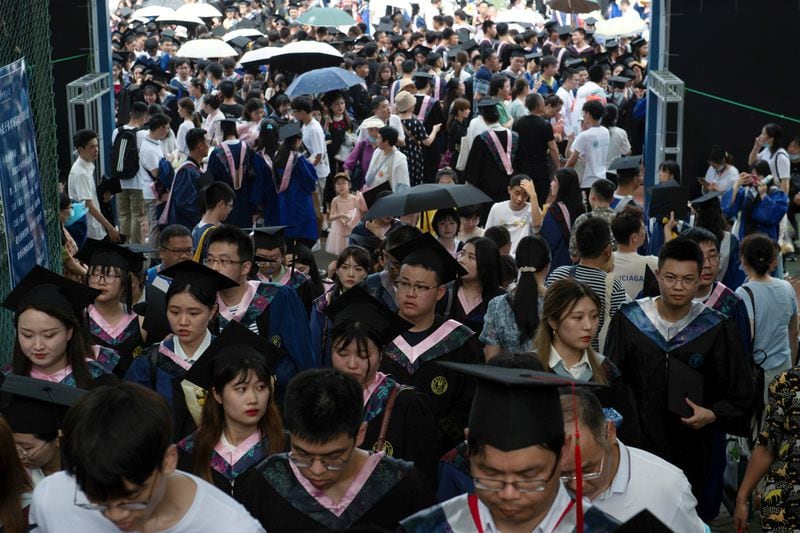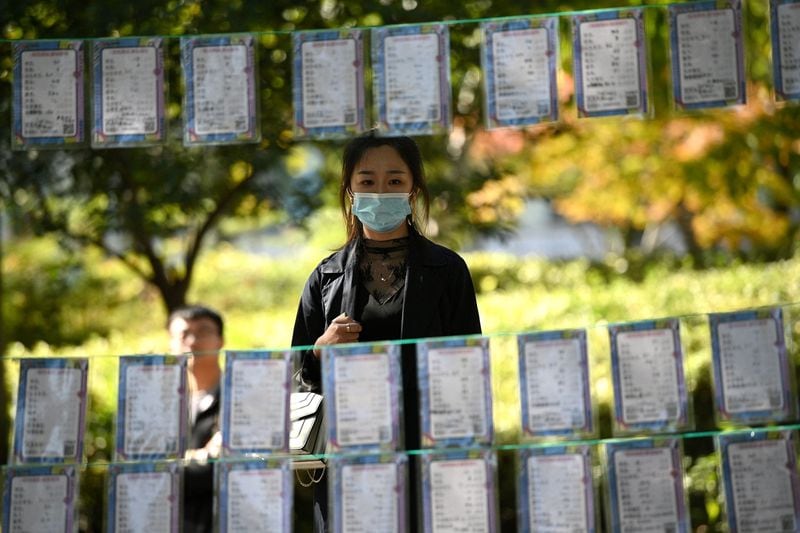Young graduates are already feeling the effects of homesickness. With the economic slowdown and difficulty finding work, some young Chinese remember their childhood in their hometown and dream of a life with fewer pressures.
In China, the phenomenon appeared for the first time on trains returning from the National Day in early October. Photos were published on social networks. Also short videos, with images of childhood swings, skateboard rides with friends or, more simply, the landscape passing by in front of the high-speed train window. A coffee in a paper cup often appears in the foreground, a sign of belonging to a more affluent environment.
The train, like the journey, is an opportunity to reflect on an era. Many comments allude to a simpler, even more serene life in the provinces, where these young people went on vacation to see their families.
Post-vacation syndrome
This nostalgia does not find its origin in simple hedonism. It also reflects the anxiety and discontent of a generation covered with labels. Some have dubbed it the “dancing” generation; a generation that “gives up” and tries to let go in the face of difficulties. This is the famous “Tang Ping” philosophy, literally “lying flat”, elongating or stretching out in the face of pressure from seniors and a corporate culture considered oppressive.
Under the hashtags #postvacationsyndrome, #student, #trainbala, the stories follow one another. Among the recurring complaints: long working hours for a salary that makes life difficult in Chinese megacities, faced with an economic slowdown.

This is a question raised by an influencer whose account on the Xiaodongshu platform – “little red book” – is attracting a lot of attention. With his dark glasses and crew cut, this young man studied at the Ecole des Hautes Études de Commerce (HEC) in Paris. He then worked in banking in the United States, before returning to China, where he was recently laid off. His videos humorously describe his experiences in the world of finance. But this time, the tone is different.
After returning from his hometown of Taiyuan, Shanxi province, he published a long article in which he talks about the end of the vacation and how he is a little jealous of his friends and family, who are enjoying of a seemingly less stressful life. , while specifying that he must return to Beijing to continue looking for work.
The art of escape
According to figures released by the National Bureau of Statistics at the beginning of the summer, more than one in five young people are unemployed in China. These difficulties in finding work are shaking the confidence of young people, already seriously damaged by years of health restrictions. Frustrated and angry during the “Zero Covid” period, the disenchanted generation wants to get some fresh air.
Some have already had their first experience abroad and want to return, while others who have not yet taken the plunge dream of studying or working elsewhere. This is “run xue”, the philosophy of departure or the art of escape, a coded expression that appeared on social networks during the Covid years, synonymous with emigration.

We know that beyond a fantasy place, there is no shortage of very real reasons to leave. “On the high-speed train, I just thought about the pressure from adults, the fierce competition in the job market, the various urgent things I have to do, the sky-high real estate prices, the deterioration of my frame of life and, of course, all of a sudden. , I’m losing hope,” says the woman named Chloé.
The young woman studied in Geneva. He is now studying law at one of the most prestigious universities in the Chinese capital: “Beijing is the opposite of Switzerland! There’s a lot of pressure at school, but East Asia is a very anxious environment compared to Europe anyway. “I feel very depressed, because after experiencing the European way of life, it is difficult for me to readjust,” she adds.
Toxic work relationships and sexism
The desire to emigrate only concerns a minority of young Chinese who have the means to go abroad. On the other hand, the difficulty of finding a job corresponding to their qualifications and studies is widely shared.
“We are all going through a time of great anxiety. My roommates who study records management, for example, are even more concerned about the lack of opportunities. For us, law students, there are three possibilities: we can join a law firm, but that is exhausting and does not correspond to the life to which I aspire; You can also apply for civil service competitions, but that’s not what I want either; Finally, I tried corporate legal services, but it’s very competitive and I couldn’t find anything,” Chloé continues.

Added to the lack of work and the poor working environment is the problem of sexual discrimination in hiring: “Enough of the sexism. If you have the same qualifications, they tend to prefer men. When people from Huawei came to our school for their recruitment campaign, they seemed more interested in interacting with male candidates, for example using the word “brother,” Chloé points out.
There are many complaints, but returning to her home province to become a “full-time child” is a step Chloe and others are not ready to take. The young woman says she thought about it a lot during the last vacation, before giving up due to lack of opportunities. Salaries are even lower in the central province of Hubei, where his parents live, not to mention the sword of Damocles that marriage represents for single people: “It’s better to be far away,” he says, “if you don’t want to face family pressures every day.
Source: Latercera
I am Robert Harris and I specialize in news media. My experience has been focused on sports journalism, particularly within the Rugby sector. I have written for various news websites in the past and currently work as an author for Athletistic, covering all things related to Rugby news.


